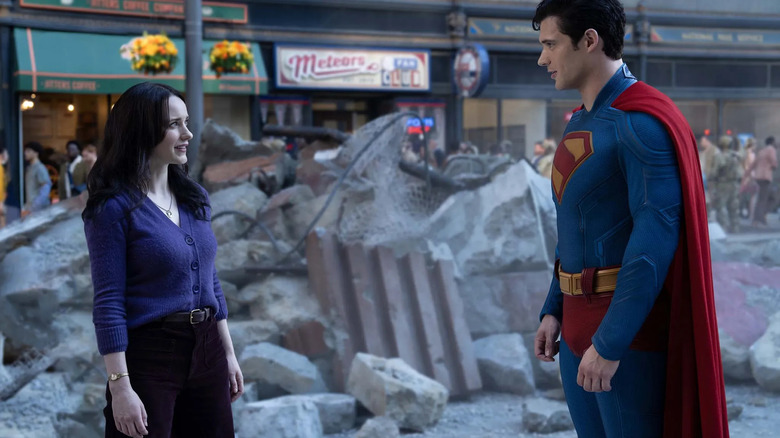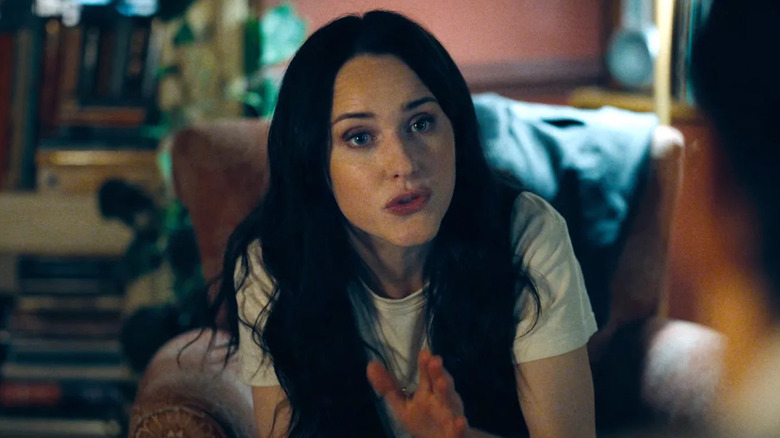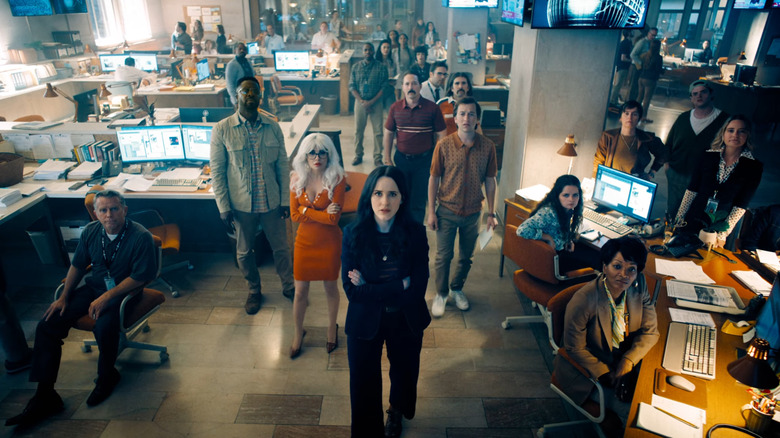James Gunn's Best Superman Scene Explains The Movie's Most Powerful Message
This article contains spoilers for "Superman."
Breaking news: Journalism is dying. Maybe that doesn't seem quite true for you, the beautiful and intelligent person reading this article, but it's a sad, slow, and seemingly unstoppable reality. Like any major cultural or societal change, the reasons for this are numerous, but there are two major ones which pose a threat not just to the livelihood of news media and their employees, but to everyone on the planet. One is the gradual erosion of the concept of truth. Sure, any philosopher will tell you that no two individuals' versions of the truth are the exact same, but for many decades, verifiable facts and expertise counted for quite a lot. In an age poisoned by social media, political grifters, and the advent of AI, facts and expertise have become drowned out by too much insidious noise. Then there's the fear held by journalists about losing opportunities just for doing their jobs. Too many journalists have learned the hard way that access and advancement can be cut off for those who aren't perceived as friendly to mega-corporations or people in power.
All of this is why those journalists who continue to do their jobs ethically and with integrity are so valuable and inspiring. It's only fair that the arts reward their good work by providing some new role models for them on screen, and that's exactly what writer/director James Gunn has done with his crowd-pleasing new "Superman" movie. Gunn's decision to include the Daily Planet, the Metropolis news publication where Superman/Clark Kent (David Corenswet) works alongside award-winning reporter Lois Lane (Rachel Brosnahan), is kind of a victory all by itself, with the filmmaker resisting the temptation to completely revamp or do away with a key element of Superman's lore in updating the mythos to the present day. Gunn even goes beyond that, as "Superman" makes it a point to champion Lois, Jimmy Olsen (Skyler Gisondo), Perry White (Wendell Pierce), and the rest of the Planet crew as people who are as integral to stopping the schemes of billionaire Lex Luthor (Nicholas Hoult) as Superman is.
When I spoke with Gunn ahead of the release of "Superman," he told me he believes "journalism is incredibly important." His film demonstrates that his belief is present throughout "Superman," no more so than within a key scene between Lois and Clark that is one of the best moments in the film. It's not only illustrative of the duo's relationship and their individual characters, but it also helps establish many key themes of the movie, chief among them the message that journalism, when done well, can save the world.
Lois and Clark's first big scene together recalls Old Hollywood verve and New Hollywood depth
The scene in question appears early in "Superman," after most of the film's setup and main characters have been established. It's notable for being the first moment in the busy film to take its time and revel in the intimacy between Lois and Clark, who're revealed to have been dating each other for several months and have no secrets between them, especially not Clark's identity as Superman. In addition to this subversion of the usual status quo for a Superman movie (in which Lois traditionally is unaware of Clark's secret), it's established that Clark, in his capacity as a journalist, is the person who conducts exclusive interviews with Superman for the Planet. It's a canny way of maintaining his secret identity, of course, but as Lois points out, it essentially means that Clark is acting as his own PR person rather than a proper journalist. Seeking to give his girlfriend what she wants, Clark agrees to let Lois interview Superman. Lois does not take the opportunity lightly, as she journalistically holds Superman's feet to the fire. She presses him on several major issues, not the least of which is Superman's recent prevention of Boravia invading Jarhanpur, something he did without caution or authority, however morally correct it may have been.
It's one of the most electric scenes in any comic book movie, and it works on numerous levels. For one, it's a lengthy dialogue scene in the middle of a very busy superhero action blockbuster, a rarity in and of itself. Gunn, cinematographer Henry Braham, and editors William Hoy and Craig Alpert approach the scene so it remains as visually engaging and well-paced as the rest of the movie, highlighting Corenswet and Brosnahan's chemistry. The whole scene is a bit of a cheeky companion piece to the Lois & Superman interview in Richard Donner's "Superman," which underlines the parallels and differences between the moments that are nearly 50 years apart. The scene establishes not just the affection between Lois and Clark, but also their fundamental differences, and how their deep-seated personalities and beliefs can be complimentary and also combative, thus demonstrating how much passion there is between them. Their banter is initially reminiscent of Howard Hawks' classic "His Girl Friday" in its wit and verve, but as their argument continues, it begins to resemble something like the depth found in Sidney Lumet's "Network" or James L. Brooks' "Broadcast News." Though the scene ends in a ideological stalemate and a emotional ellipsis — this is an early scene in the film, after all — it brilliantly gets at just how important having journalistic integrity, or indeed just plain moral integrity, is to these characters and to the movie itself. Clark calling Lois "Cronkite" at the beginning of the scene isn't just an off-the-cuff pop culture reference; it's a mission statement, a reminder that journalists used to be regarded as heroes.
Gunn's Superman shows Lois and the Daily Planet crew actively being journalists
The rest of "Superman" sees Gunn following through on the promise of that Lois and Clark scene, showing how the duo, as well as their journalist coworkers, are all heroes. Throughout Superman's long history on the page and screen, it's become easy for the revolving door of artists behind the character to take the journalism of Lois, Clark, and the Daily Planet for granted. For example, after some cataclysmic problem is solved by Superman, the Planet will publish a story on it written by Lois and/or Clark, and that's about the extent of it. In other words, the Daily Planet is a small factor in most Superman stories, and not the main focus. Gunn's film refuses to let that stand; here, the Planet crew are not just around to act as a cover for Superman/Clark's identity, to merely stand in for the average humans Superman is seeking to serve, or to just be put in distress. They're there to be active participants in the story, with their contributions helping to save Metropolis as much as Superman's.
Lois gets the bulk of the action, of course, going on her own side quest to find and rescue Superman from Luthor's pocket dimension prison alongside Mr. Terrific (Edi Gathegi). Yet Jimmy Olsen (Skyler Gisondo) has a major role to play as well, with his apparently irresistible charm inspiring his ex, Eve Teschmacher (Sara Sampaio), to send him incriminating evidence of Luthor's scheme to take over Jarhanpur. During the final battle, while Superman is doing the physical work of stopping Luthor, the Planet crew are flying above the city in Terrific's ship, working as a bullpen in order to get the exposé piece on Luthor published. The piece goes viral, ultimately leading to Luthor being arrested for his crimes. In a world where Luthor had sullied the reputation of Superman in the public eye, it's only the proper journalism of the Daily Planet writers who are able to ensure that justice is done.
The usage of the Daily Planet characters are another example of how well Gunn works with a large ensemble, giving everyone a chance to contribute in some way. Yet it's more than just that, as the Lois and Clark scene proves. "Superman" is a movie that has a very Frank Capra-esque message, the notion that one man can make a difference, not because of physical super powers, but thanks to how many other good people he can touch and inspire. This notion lies at the heart of all good journalism, which is done not for the individual, but for the good of the people and society. Maybe it takes a superhero to remind us of that. Maybe all we need is to be reminded that goodwill is a virtue, truth exists, and we don't need to fly in order to be a hero.
"Superman" is in theaters now.


